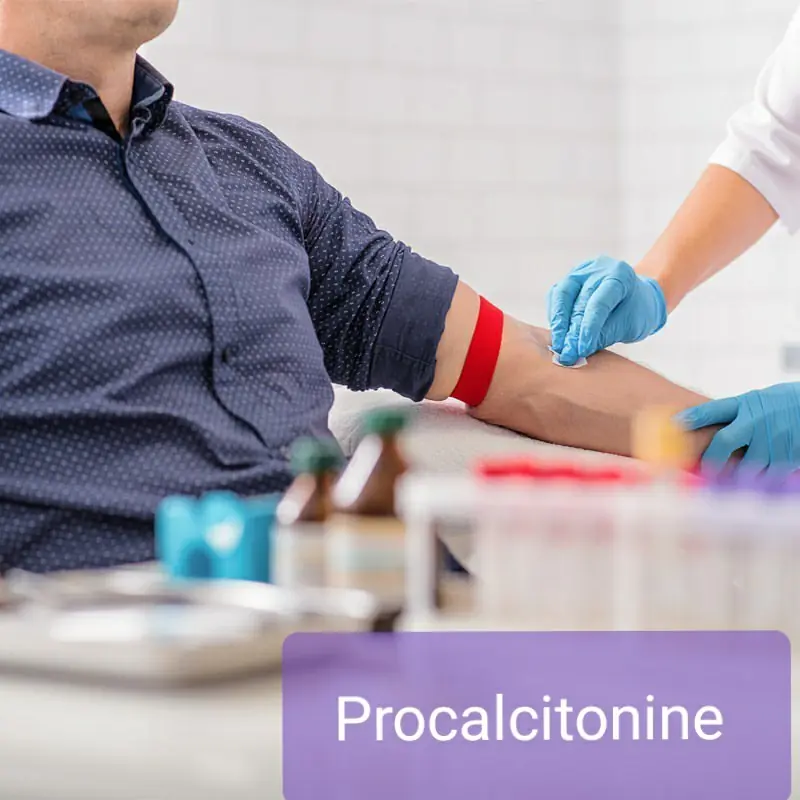🏾 Contents:
- What is a procalcitonin ?
- Procalcitonin test
- What is the normal value of procalcitonin?
- Interest of procalcitonin testing
- Procalcitonin versus CRP
🏾 What is a procalcitonin ?
Procalcitonin is an early, sensitive, specific marker of bacterial infections. PCT is a polypeptide pro-hormone of calcitonin, a hormone synthesized by thyroid cells and involved in calcium homeostasis.
PCT circulates in very small quantities (< 0.1 µg/l) in the blood of healthy subjects. Its production can be stimulated by bacterial endotoxins. Elevated procalcitonin level correlates with severity of infection (up to 10,000 times)
The PCT assay measures the level of procalcitonin in your blood, it is indicated in suspected bacterial, parasitic or fungal infections (PCT is not increased during viral infections)
It is measured using a simple blood sample.

🏾 Procalcitonin test
In general, there are no special preparations to make before testing, it is a blood test that can be done at any time and does not require fasting, except whether your blood sample will be used for further testing.
🏾 What is the normal value of procalcitonin ?
In healthy individuals, procalcitonin is rapidly transformed into calcitonin. Therefore, PCT values in uninfected individuals are very low < 0.1 µg/L. Levels greater than 0.25 ng/mL may indicate the presence of an infection.
- If your results show an high level of procalcitonin, it is likely that you have a serious bacterial infection such as sepsis or meningitis. The higher the level, the more serious your infection may be.
- If you are being treated for an infection, a decrease or low procalcitonin level may show that your treatment is working.
Note: Values should be interpreted based on the clinical context.
🏾 Interest in testing procalcitonin
Le médecin peut demander un test de procalcitonine pour :
The doctor may order a procalcitonin test to- Diagnosis of bacteremia and sepsis.
- The differential diagnosis of bacterial vs viral meningitis.
- Differential diagnosis of community-acquired bacterial and viral pneumonia.
- Determining the severity of a septic infection.
- Telling if an infection or disease is caused by bacteria.
- Monitor the effectiveness of antibiotic therapy.
- Diagnosis of bacterial infection in neutropenic patients.
- Differentiating between inflammation versus infection
🏾 Procalcitonin versus CRP
The PCT rises very early after the start of the infection (3 hours), its half-life is quite short (about 24 hours) and the rate decreases rapidly in the event of improvement, making it possible to shorten duration of antibiotic treatment
CRP is a good marker of the acute phase of inflammation, its use to distinguish infection bacterial from a viral infection is less obvious.
🏾 Is procalcitonin elevated in viral infections?
The concentration of procalcitonin increases in bacterial infections but remains low in viral infections and inflammatory diseases. The change is rapid and the molecule is stable, making it a potentially useful marker for distinguish between bacterial and viral infections.
🏾What are the advantages of PCT over other biomarkers?
The advantages of PCT over older markers include:
- Specificity for bacterial infection (versus inflammation in general).
- The speed of its rise after an attack (6 hours).
- Rapid decline with immune control over infection (24h half-life).
- Excellent correlation with disease severity (higher levels in more severely ill people).
- Absence of impact of anti-inflammatory and immunosuppressive states on production.
🏾How to reduce procalcitonin?
Serum procalcitonin levels decline rapidly with appropriate antibiotic treatment (48-72 hours after admission).
Référence
- J.O. Robinson - Utilité de la procalcitonine dans le diagnostic et le suivi des infections chez les patients neutropéniques fébriles
- La CRP ou la PCT: Quel est le meilleur marqueur d'infection bactérienne?
- University of Nebraska Medical Center - Procalcitonin (PCT) Guidance
- thermofisher - Understanding Procalcitonin
- Derrick A - Procalcitonine
- NIH - Procalcitonine TEST
- A. toitot - Les marqueurs du sepsis une femme enceinte porteuse d’une coronaropathie ?